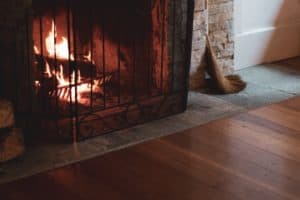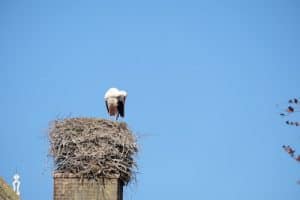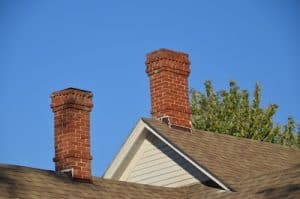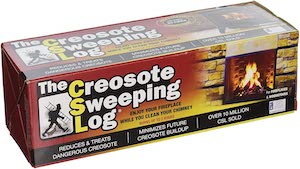How to Tell if Your Chimney Needs to be Cleaned
There’s nothing like sitting around your fireplace in the winter, feeling warm and cozy. To get the most out of your fireplace, the chimney needs to be cleaned out periodically. Here is a guide to help you know if and when you need to clean out your chimney.
Does my chimney need to be cleaned? If you see black, oily spots on the walls of your fireplace, poorly burning fires, odors coming from the fireplace, and animals making noise inside the walls of your chimney then your chimney does need to be cleaned.
Now that you know the signs to look for, let’s examine each one in greater depth.

Here are our top 9 Signs that Your Chimney Needs to Be Cleaned:
- Oily Spots on the Walls of Your Fireplace
- Poorly Burning Fires
- Odors Coming from the Fireplace
- Animals are Inside Your Chimney
- Smoke Doesn’t Rise Up the Chimney
- Fires are Difficult to Get Started
- Chimney Soot is Falling from the Chimney
- The Chimney Damper has Black Creosote Buildup
- There isn’t Air Flow Up the Chimney
1. Oily Spots on the Walls of Your Fireplace
The black, oily spots on the walls of your fireplace are a tar-like substance called creosote. This substance builds up all the way to the top of your chimney and can cause some hindrance to airflow. This drop in airflow causes fires to burn colder and in irregular ways.
2. Poorly Burning Fires
If you are having difficulty starting fires in your fireplace, it could be because the chimney is clogged, or there is a malfunction with the fireplace damper. Both of these issues can keep a fire from getting a sufficient supply of oxygen to burn properly.3
3. Odors Coming from the Fireplace
Creosote has a campfire-like odor that you can smell in the area around the fireplace. This odor might smell good to your nose, but it is an indication that the buildup in your chimney can catch fire and cause significant damage to your home and everything in it.
4. Animals Inside the Chimney
Animal nests can both block the airflow in your chimney and catch fire while burning wood in your fireplace. Bird nests are most commonly found at the very top of your chimney, covering the vents. Squirrels are also known to make nests in chimneys for their young.
These signs are easy to spot, but taking steps to ensure your home is safe from the risk of fire damage is the next step. You can hire a chimney sweep to clean your chimney and fireplace or do it yourself. You can also have a home inspector check out your chimney to make sure it’s up to code. If you decide to clean your chimney yourself, here are some helpful tips to make the process go smoothly.
5. Smoke Doesn’t Rise Up the Chimney
If you notice that smoke doesn’t rise up the chimney like it used to it may be time to clean your chimney. There should be air flow up the chimney but a layer of creosote can stop up the works.
6. Fires are Difficult to Get Started
Fires need oxygen but a dirty chimney can make it hard for your wood to get the air it needs to get going.
7. Chimney Soot is Falling from the Chimney
If you have chunks of chimney soot or creosote falling down on your wood from the chimney then that’s a good sign that you have a creosote build up problem and the chimney needs to be cleaned.
8. The Chimney Damper has Black Creosote Buildup
If you notice that your damper is completely black then it’s time to have your chimney cleaned.
9. There isn’t Air Flow Up the Chimney
Even without a fire in the chimney, you can often feel a flow of air moving up if you have the damper open. If there is no air flow or movement of any kind even on a windy day it is a good sign that your chimney needs to be cleaned.

How to Clean Your Chimney
There are a few different methods for cleaning out your chimney.
1. The first and easiest method is using a Creosote Sweeping Log.
These logs are treated with chemicals and additives that bond with the creosote, reducing the deposits and making them less likely to start a fire. Over the next few weeks burning wood logs, the heat and air break up the treated creosote, sending it out the top of your chimney or dropping it down into your fireplace.The campfire odor caused by the creosote will mostly go away once your chimney is cleaned, but the brick or stone material absorbs some of the odor left by the creosote. The smell is harmless; as long as the creosote is gone, there is no risk of a fire starting in your chimney and spreading to the rest of your house.
2. Another method of cleaning you may have to employ is the chimney brush.
This is a long pole with a bundle of wire bristles at the end. If the creosote buildup is too thick for the Creosote Sweeping Log to break down, sweeping the creosote by hand with a chimney brush can be an effective alternative. This can also knock other debris and animal nests free of the chimney walls and vents to open the airways, creating better airflow for a hotter, more even flame.
Chimney Cleaning Safety
When cleaning your chimney, you will scrape off a lot of creosote. Usually, it comes off in big chunks that can be discarded. At times the creosote is in smaller flakes and can agitate and harm your airways.
A disposable breathing mask is recommended when sweeping your chimney out. You may need to get on the roof safely to reach the very top of the chimney as well. Be careful and secure yourself to a fixed point on the roof. A great place to strap yourself up is the chimney itself. If you do choose to sweep your own chimney make sure to follow our roof safety guide found here: Roof Safety Guide.

How Often Should You Clean Your Chimney?
The National Fire Protection Association says chimneys should be inspected once a year. The best time to do it would be in the late summer/early fall before use in the winter. If you notice any of the signs in your inspection, it’s time to clean out the chimney.
If you are buying a new house, you don’t know when the last inspection was, so it is prudent to inspect it as soon as possible. You don’t want any surprises in the first winter living in your new home. Some house fires are traced back to a dirty chimney, so inspecting your chimney is a must if you plan on using your fireplace.
Related Questions
When Should You Hire Someone to Clean Your Chimney?
You may be realizing that cleaning your chimney is not an easy task. Some things you may run into while trying to clean are beyond your ability.
In these cases, it may be time to hire a professional to clear out your chimney. If you have any hang-ups about cleaning the debris out of your chimney, leaving it to the professionals will save you a lot of headaches (and backaches).
What is the Price Difference Between Cleaning a Chimney Yourself and Hiring Someone?
When it comes to cost, you must determine which route to take. Hiring a chimney sweeping company can cost anywhere from $80-$200, whereas buying a chimney brush will only cost you around $70 at most hardware stores. There are pros and cons to both avenues, and as such you must determine what works best for you.
Hiring a company to clean your chimney can give you peace of mind knowing that it was done right, but cleaning your chimney yourself can save you a lot of money in the long run. As an added bonus, you will have a new skill with which to impress your fellow homeowners. Now that’s what we call Expert Home-owning.

